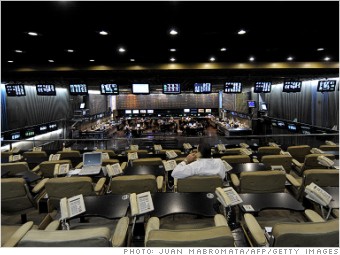Search News
We're no longer maintaining this page.
For the latest business news and markets data, please visit CNN Business
From Japan and the Philippines to the United Arab Emirates and Kuwait, these countries' stock markets have rallied more than 20% so far this year.

After ending 2012 almost 40% below their all-time highs set just a year earlier, Argentine stocks have been on a tear in 2013.
But the advance isn't being driven by improving fundamentals.
It's "a classic contrarian play," said Asha Mehta, portfolio manager at Acadian Asset Management. "Argentina's market was one of the worst frontier markets in 2012. Prices became so depressed that bargain hunters began to see value and have started to come back in."
While stock prices may be low, there are still plenty of risks, warns Mehta.
Argentine President Cristina Fernández de Kirchner, who became a controversial figure after nationalizing Argentina's largest oil company last year, has come under pressure for her economic policies.
While she's still popular, the Argentine people have increasingly become disgruntled over her inability to turn the economy around. More than a million protestors recently took to the streets to express their anger.
Argentina has one of the highest inflation rates in the world, with most economists projecting it at 25%.
Meanwhile, all eyes are also on a U.S. appeals court ruling that could push Argentina to the brink of default. A panel of judges is deciding how to settle a case between the Argentine government and holdout creditors, who claim they are owed nearly $1.5 billion on their defaulted bonds.
Given the ongoing uncertainty in Argentina, Mehta expects trading to be volatile.